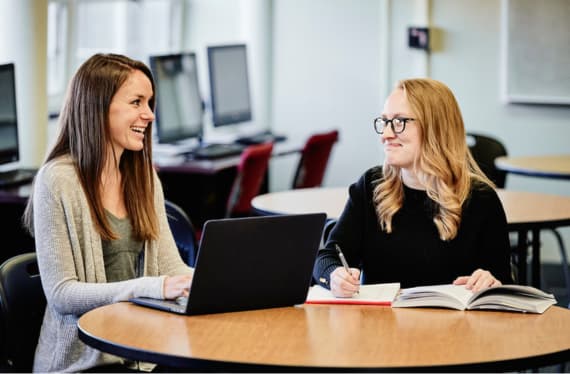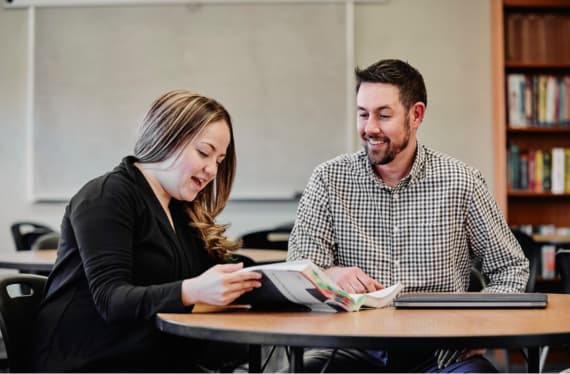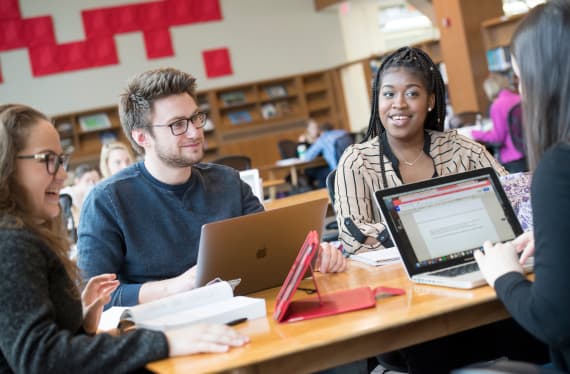Are you excited by the idea of making an impact in the lives of students with learning differences? Children with a variety of learning challenges are often greatly affected in how they learn in the classroom and interact with others. Since special education teachers are meant to support this wide range of learning disabilities, their skills often extend far beyond conventional teaching methods.
To thrive in this fulfilling and impactful career, it’s important to understand what the role entails so you can provide inclusive learning environments, foster individual growth, and accommodate the diverse needs of your students. Here’s an overview of this incredibly rewarding career path, as well as the most important qualities and skills needed to be successful as a high quality special education teacher.
What Makes a Good Special Education Teacher?
Professionalism and ethical standards are essential skills to be a good special education teacher. Honesty, integrity, and fairness should guide your actions and decisions, while remaining up-to-date in this field will enable you to maintain a high level of professional competence.
Commitment to collaboration, self-awareness, reflection, and respect for diversity are additional qualities that are valued in special education teachers. These character traits are what Regis College looks for in prospective applicants to their Master’s in Teaching Special Education.
This is largely because special education teachers engage with parents and colleagues frequently to provide the best learning strategies for students that are both innovative and inclusive. “You can't do what the teacher next door does. It doesn't always work for your group of students,” says Dr. Priscilla Boerger, program director of Regis College’s Master’s in Teaching Special Education.
Top Skills Required for Special Education Teachers
While the previously mentioned qualities are essential to your success as a special education teacher, there are additional qualifications and skills that can boost your potential for landing a special education teaching job.
When preparing to become a highly qualified special education teacher, it’s important to consider the baseline skills needed to be an effective educator. According to our analysis of job postings data, here are the top skills school districts and principals want in prospective teachers and how they can enhance your performance as a special education teacher.
Top Skills for Teachers
1. Teaching
As an educator, you’ll have the rewarding opportunity to guide and inspire students in the classroom. In the case of special education, this means breaking down complex concepts, adapting instructional strategies, and providing individualized support is crucial. No matter what population of students you work with though, effective teaching ensures all students receive the knowledge and skills they need to thrive academically and personally.
2. Communications
Communication is fundamental to your success as a teacher because it’s the cornerstone to how students absorb instruction, curriculum, and guidance. All children process information in their own way, but students with learning challenges may have impairments that limit speech, hearing, vision, or social awareness. As such, developing effective communication methods enables you to convey instructions, provide feedback, and address concerns that ensure everyone is on the same page in supporting student growth.
3. Writing
Writing skills are indispensable for teachers since assessments and curriculum materials are often written by the instructor. Special education teachers are responsible for additional written materials, such as individualized education plans (IEPs), progress reports, and other documentation to track student development. Writing also enables you to communicate clearly with other professionals—such as psychologists or speech therapists—who collaborate on education plans.
4. Planning
On a daily basis, teachers must manage their time well and plan activities to meet learning goals. Special education teachers have additional planning responsibilities that focus on the short- and long-term goals of students with various learning challenges. While short-term planning in special education may involve more immediate activities that can help inform students’ IEPs, long-term planning is meant to anticipate potential challenges, develop assessment models, and adapt strategies to accommodate diverse learning styles.
5. Management
Teachers are responsible for maintaining a positive learning environment that promotes student engagement. “Classroom management is key because without a managed classroom, learning's not happening,” says Boerger. By implementing consistent rules, routines, and behavior management strategies, you can support students in achieving their full potential and minimize disruptions. In this way, strong management skills enable you to create a safe and nurturing space where students can focus on learning.
6. Mathematics
Math proficiency is an important skill in the classroom because teachers often work with students who require additional support in this subject. Having a solid foundation in mathematical concepts and problem-solving strategies can actually aid in designing the most beneficial instruction techniques.
7. Interpersonal communications
In addition to communication with students, teachers are also constantly communicating with fellow educators and parents. Since special education teachers frequently collaborate with students, parents, and support professionals, having strong interpersonal communication skills can greatly improve the ability to advocate for student needs.
“Communication with parents and guardians is so critical to building partnerships with the families,” Boerger explains. “Teachers can't always do it alone, so having those families work with the teachers for their child's success is going to be critical.”
8. Research
Thorough research skills are beneficial when educators encounter unfamiliar situations. Not only does research keep you informed about best practices, but it also helps you discover new interventions and evidence-based strategies. By fostering ongoing professional development through research, you can make more informed decisions that positively impact student outcomes.
9. Leadership
Leadership skills are important for empowering teachers to advocate for students, influence positive change, and collaborate well within teams. By taking initiative, demonstrating strong communication skills, and being proactive in problem-solving, you can better support the overall success of your students.
10. Problem-solving
While all teachers need to be adaptive, special education teachers have to be flexible and creative when facing a variety of challenges. Some of these problems can range from disruptive behavior to resource management. By analyzing situations, assessing student abilities, and developing creative solutions, you can adapt your teaching strategies to address student needs.
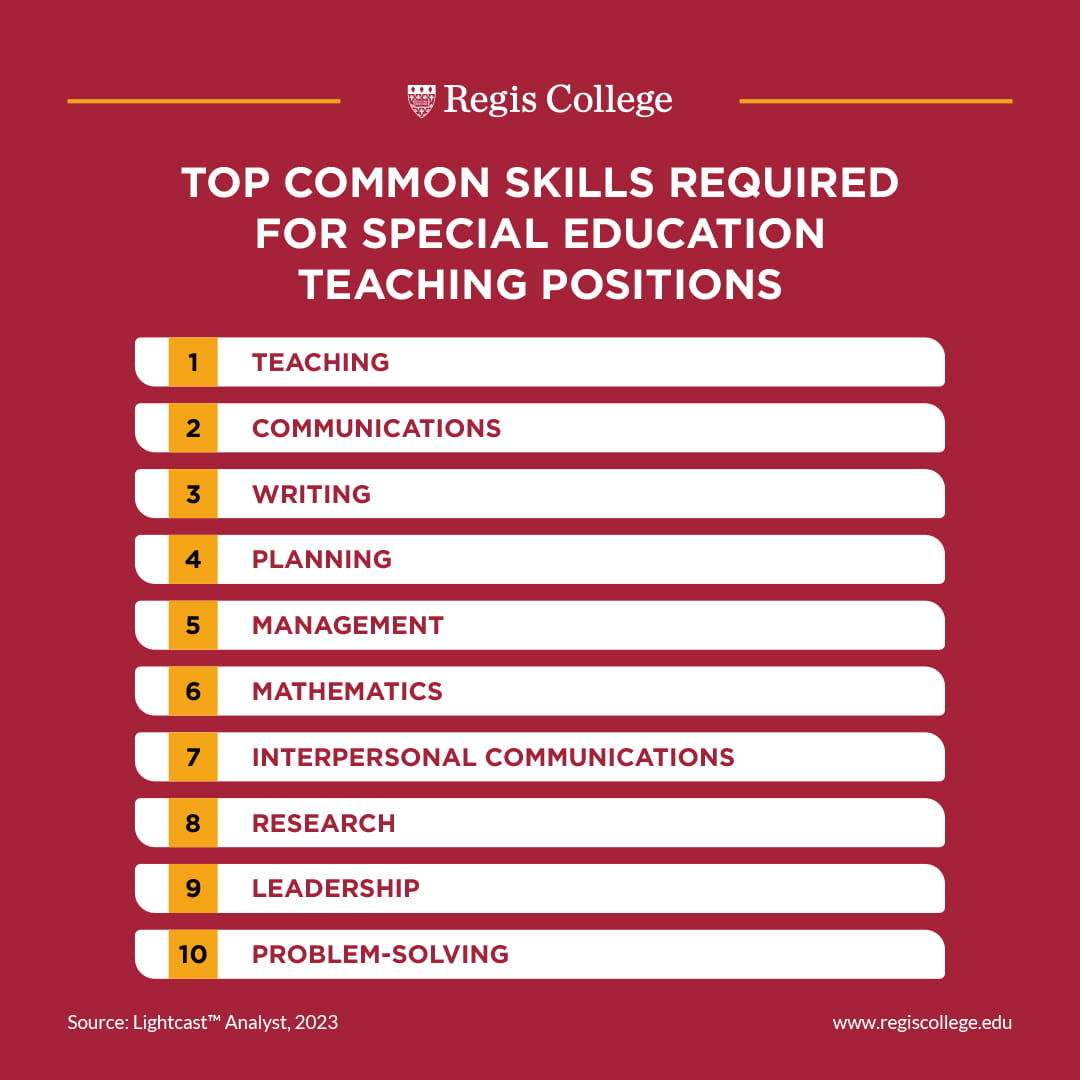
Top Skills for Special Education Teachers
While these highly valued skills for teachers are important to your success in special education, there are a number of skills that are specific to the industry.
According to our analysis of job postings data, here are the top job-specific skills employers look for in a special education teacher.
11. Special education
Special education training equips teachers with the skills to evaluate learning disabilities and provide a safe, equitable learning environment. Special education teachers need to be knowledgeable of inclusive practices, legal requirements, and strategies to support students with diverse needs.
12. Individualized education programs (IEP)
Individualized education programs outline the specific goals, accommodations, and services for students with disabilities. Gaining a better understanding of how to develop and implement IEPs allows you to effectively assess students' strengths and needs, and ensure they closely align with the IEP objectives.
13. Lesson planning
Well-structured lesson plans are a major part of creating a rewarding classroom environment that caters to different learning abilities. For special education teachers, lesson planning involves selecting appropriate resources, setting benchmarks, incorporating accommodations, and designing objective-driven activities.
“From the very beginning, students write lesson plans in our program,” says Boerger. “They actually do what's called a ‘gateway assessment,’ which is where we assess them on reviewing a lesson to see if they can find things that are missing or how to make it better.”
14. Disabilities
A comprehensive understanding of disabilities is necessary to accommodate the unique challenges faced by students with learning differences. By recognizing the strengths and limitations associated with various disabilities, you can foster a nurturing environment for all students and implement individualized learning plans.
15. Classroom management
“Classroom management is not only important, but it's the skill that we hear from our supervising practitioners in the classrooms that students lack the most,” Boerger notes. Special education teachers must establish clear expectations and boundaries while offering positive reinforcement. They have to strike a good balance between offering consideration, driving progress, and limiting disruptions—which requires a mix of patience, confidence, and experience.
16. Autism spectrum disorders
Since children with autism spectrum disorder (ASD) are prevalent in special education, learning to identify characteristics, needs, and interventions specific to ASD is crucial. Teachers must be prepared to manage challenging behaviors and adapt instructional techniques to communicate better with these students. As a result, knowledge of ASD empowers you to promote social and academic growth for students on the spectrum.
17. Curriculum development
Special education teachers often play a role in curriculum development, ensuring that it’s accessible and adaptable for students with disabilities. By modifying curriculum materials, differentiating instruction, and incorporating multi-sensory approaches, you can provide meaningful learning experiences, while also addressing individual student goals.
18. Working with children
Educators who are passionate about working with children will be most successful in this career. Patience, empathy, and the ability to build rapport are essential in establishing positive relationships with your students and recognizing their individual strengths and interests. Focus on being an active listener, providing emotional support, and fostering a nurturing environment, so you can create a sense of belonging and trust.
19. Behavior management
Special education teachers have to be skilled at recognizing the underlying factors behind challenging behaviors. By promoting positive reinforcement, using visual cues, and implementing structured routines, you can support students in self-regulation and social-emotional development.
20. Instructional strategies
Having a rigid outlook won’t serve you well as an educator. Classroom teachers draw from a broad toolkit of instructional strategies, which they can tailor to different students based on cognitive and physical disabilities or behavioral challenges. To make the learning experience both practical and enjoyable, special education teachers must learn to deliver information in ways that are engaging and encourage students to take an active role in their own education.
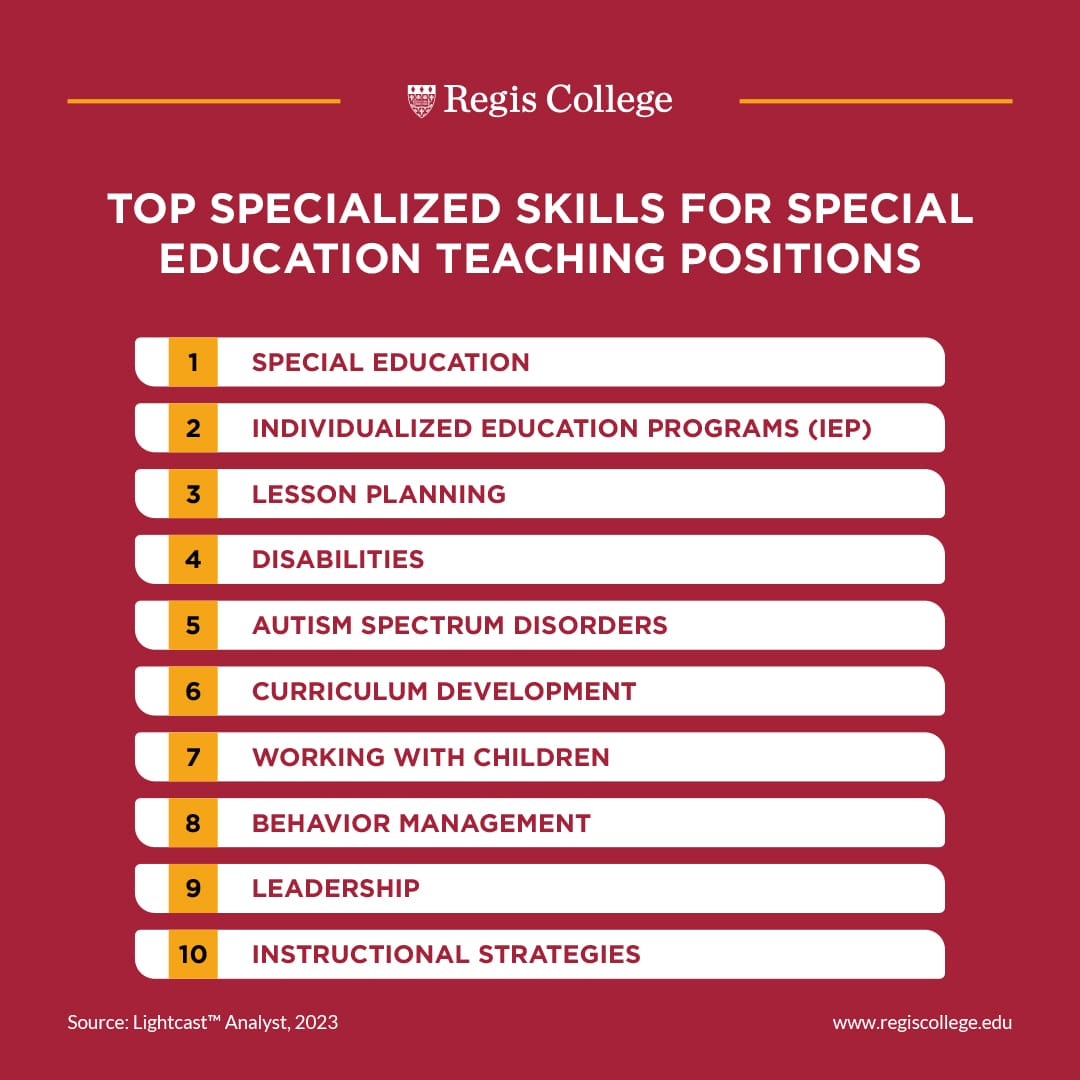
Technology Skills Teachers Need
With the evolution of technology found in today’s classrooms—and the emergence of hybrid online learning—teachers are often expected to have a number of computer/technology skills to succeed. Special education is no exception.
According to our analysis of job postings data, here are the most sought-after technology skills for special education employers.
21. Microsoft Office (Excel, Outlook, PowerPoint, Word)
Proficiency in Microsoft Office programs improves organization, communication, and instructional delivery. Educators need tools to track student progress, analyze data, create classroom materials, present information, connect with parents and peers, and keep records. Above all, mastery of widely used tools will make it easier to get acclimated to the teaching environment and support student learning.
22. Zoom (video conferencing tool)
Zoom and other video conferencing tools have become essential for remote learning and collaboration. Learning to host video calls enables you to conduct live online classes, hold virtual meetings, and facilitate remote check-in sessions with students and families. Video conferencing also allows for seamless communication and instructional continuity when students have health issues or personal challenges keeping them out of the classroom.
23. Student information systems
Student information systems (SIS) streamline administrative record-keeping and allow smoother collaboration across different special education services. Familiarity with SIS ensures efficient data management, improved student assessments, and increased evidence-based decision-making. Teachers also need to learn how to input and retrieve data correctly in these systems so school systems can maintain accurate records.
24. Learning management systems
Learning management systems (LMS) provide a centralized platform for delivering and organizing educational content. LMS tools help special education teachers create online learning materials, track student participation, enhance accessibility, and promote independent learning. Boerger urges prospective teachers to gain exposure to learning technologies as much as possible during training. “When you do observations or volunteer work, really pay attention to the technology being used so that you can become well-versed in it.”
25. Spreadsheets
Spreadsheets continue to be go-to tools for organizing and analyzing data, which helps teachers gain valuable insights into student performance. Having an advanced knowledge of spreadsheet functions also allows you to streamline common tasks and generate reports for more efficient decision-making.
26. Google classroom
Google Classroom is a popular platform for delivering online learning and managing workflows. By leveraging the platform’s many features, teachers can facilitate real-time collaboration, distribute assignments and resources, monitor student progress, and provide timely feedback.
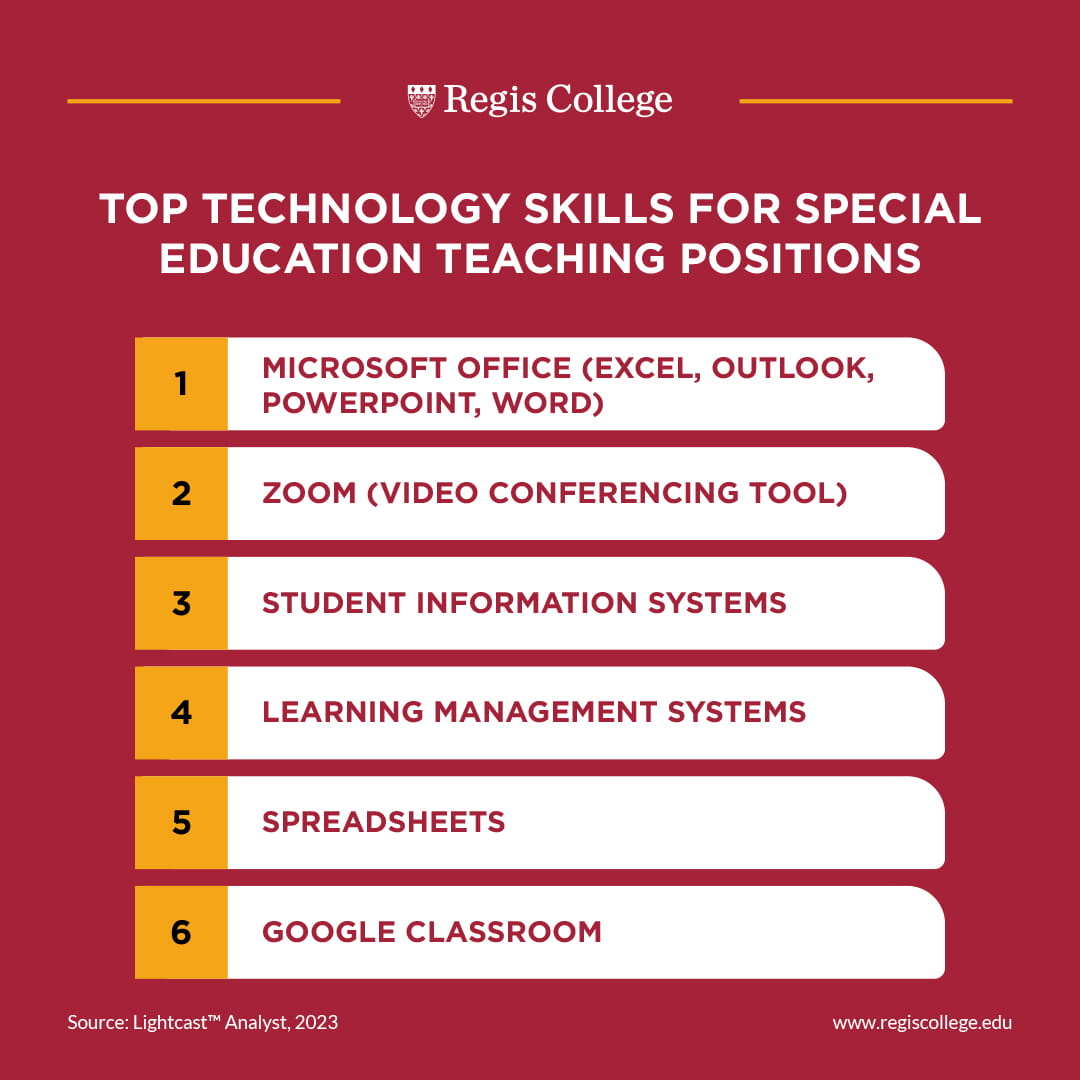
Become a Qualified Special Education Teacher
The impact of effective special education extends far beyond academics, as demonstrated by these top skills in the field. “Teaching special education is not for everybody, but we do need qualified teachers. There are a lot of kids who need a different way of teaching, and a different way of learning,” says Boerger.
Qualified special education teachers can help close today’s learning gap and build more inclusive environments that foster academic growth and social development. Luckily our analysis of occupation data reveals that special education teaching jobs are expected to grow at a rate of 9.5 percent from 2021 to 2031.
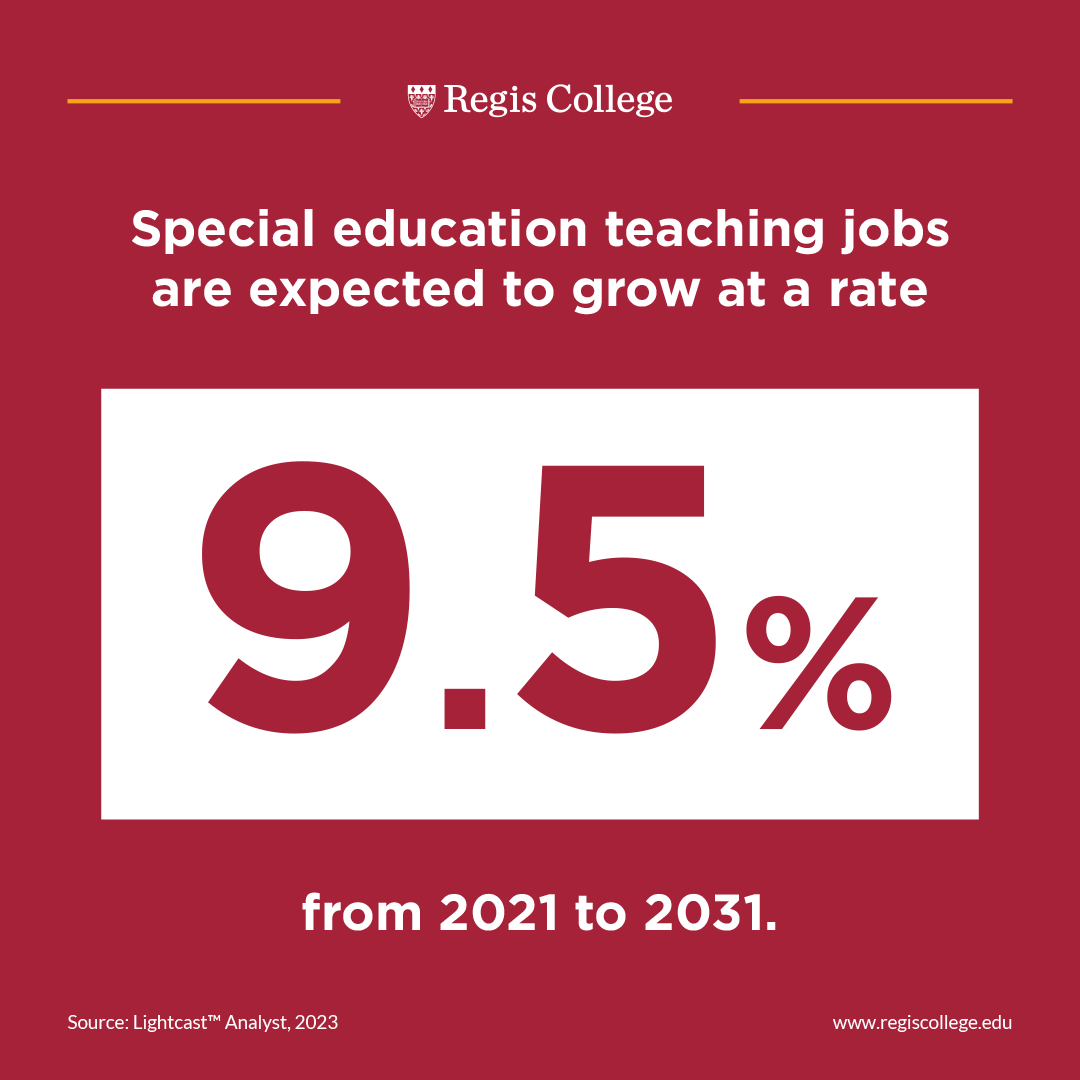
So if you’re interested in supporting children with unique needs, consider speaking with an admission counselor to learn more about the special education degree program at Regis College. This program can help you develop the skills needed to provide quality special education needed to reap the many benefits of becoming a special education teacher.


